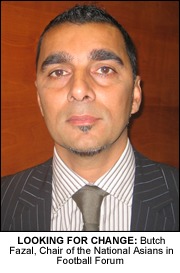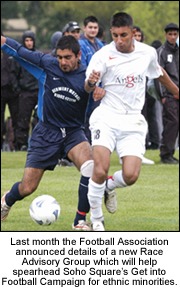FA plans to get more Asians into football
 FOR the past decade the issue of Asian under-representation within British football has been a contentious topic. When Jas Bains published the ironically titled ‘Asians Can’t Play Football’ in 1995 it kick started a process that attempted to dissect the problem of why the Asian community were unequivocally absent from a game that meant so much to them.
FOR the past decade the issue of Asian under-representation within British football has been a contentious topic. When Jas Bains published the ironically titled ‘Asians Can’t Play Football’ in 1995 it kick started a process that attempted to dissect the problem of why the Asian community were unequivocally absent from a game that meant so much to them.
While it made people at the highest level of the game sit up and take notice, a decade later the situation had changed little. Jas Bains’ follow-up study ‘Asians Can Play Football: Another Wasted Decade’ in 2005 was testament to that.
Last month the Football Association announced details of a new Race Advisory Group which will help spearhead Soho Square’s Get into Football Campaign for ethnic minorities.
Former Wimbledon star Robbie Earle, Kick it Out’s Lord Herman Ouseley and Chair of the National Asians in Football Forum, Butch Fazal, are just three faces on the board that will hope to impact change within British football.
The aim is simple – let’s get more Asians into the game. But not just on the football field. The FA finally seem committed in getting more Asian faces within the wider spectrum of the game – from playing and officiating to spectating and administrating.
But you’d be forgiven for thinking you’ve heard it all before. The FA were urged to act in 1995 and 2005 yet their endeavours were criticised. So will the newly formed Race Equality Advisory Group actually change anything?
We spoke to Butch Fazal – a member of the group and chair of the National Asians in Football Forum – to find out just how committed the FA really are in getting Asian faces into the beautiful game.
Butch you’re part of the new FA Race Equality Advisory Group (REAG). How did you get involved in this?
I was on the previous advisory group which has now been superseded by the new Race Equality Advisory group which reports directly to the FA board. Since the Burns Review which inspected the make up and structure of the FA it was identified that the FA needed to ensure its decision making structure was more representative of the wider community. To enable this to move forward the Race Equality Advisory group was set up. Membership was by invitation from the FA subject to the member meeting the commitment and matching the required skills and qualities that the FA wanted.
What are the aims of the new Advisory group?
Ensuring that the needs of the ethnic minorities and emerging communities are met in football are absolutely essential so that’s a key aim for the group. The group will also report directly to the FA which is the first time this has happened – it shows just how serious the FA is about the work of the new group.
In the past, from a communication prospective, the FA looked at itself introspectively and realised that there were a lot of gaps in their knowledge and now they are actively reaching out to the community and likeminded people who are within the community that can impact change. That’s a major move for the FA and that needs to be recognised.
The lack of Asian faces within football (from players/spectators etc) has been widely documented since the release of the ‘Asians Can Play Football: Another Wasted Decade’ report in 2005. We’re no nearer to change so will the Advisory Board actually change anything?
We’ve got a real opportunity to articulate the frustrations and disappointments of an Asian community that has been largely excluded from the national game. As an advisory group we can only serve to keep this issue high on the agenda and remind those governing the game the importance of the equality of opportunity and participation for our community. So I believe the group will have a positive contribution to make to these issues.
Across the country there are projects and newly formed football clubs that continue to strive to towards creating a critical mass of quality players who will be knocking on the doors of professional clubs demanding an opportunity and I think that’s the key point.
In the past where we have talked about Asian footballers and our community and we’ve looked at ourselves we’ve questioned whether we’re good enough. Now we don’t need to ask that question any longer because we’re actually playing. The reason why I regard the lack of Asian faces within football as ‘exclusion’ and not ‘under-representation’ is because we’re not like other institutionalised bodies out there like the police where they’ve looked at themselves realised they’re under-represented and they’re making a drive to do something about it – we’re actually playing the game. Our kids are playing football and they’re saying to us ‘why aren’t we getting opportunities at the highest level’. Our aims are clear. Firstly to explode the myths that have denied us participation at the highest level – lack of physical strength, lack of parental support, preference to academia. These are only a few of the tedious arguments that have obstructed our progress. We’re absolutely determined with the group that we’ve got now and the likeminded people we’ve got on board that we are actually going to debunk some of those theories.
How does the Asian community view the current situation at the moment?
I’ve been across the country listening to the Asian community and lot of the frustration comes from the fact that it’s very difficult to tap into the financial resources to actually create a sustainable project. In the past we’ve had fantastic projects that have been badly resourced. What we’re saying now as a group is that we can link you up with those organisations that can help you. We’re going to create a critical mass of people and then in the end our objections can’t be denied because there will just be such a mass of people that want to play the game and if the governing body doesn’t do anything about it and the professional clubs don’t do anything about it we’ll just embarrass them.
 Is it fair to point the finger at professional football clubs or bodies for the lack of Asian involvement or is this a problem which ultimately stems from within the Asian community?
Is it fair to point the finger at professional football clubs or bodies for the lack of Asian involvement or is this a problem which ultimately stems from within the Asian community?
Historically and culturally we talk about this gap in knowledge and if I put my hands up and be honest my parents probably didn’t know anything about football. But I’m second-generation Asian and I’ve got teenage sons who are absolutely desperate to play the game and I am aware of what the process is. I think what we’re doing as a community is educating ourselves about football, educating ourselves about how the scouting procedure works and I don’t think it’s a case of finger pointing. Anyone who does the maths is aware that only 5 Asian players are playing in professional football and frankly that’s a disgrace. It’s the governing body and football clubs that promote race quality and we are going to ensure that they stay true to their word, holding them accountable to the equal opportunity policies that they say they have. There can’t be anymore reports of Another Wasted Decade, this resistance to change that they have at the moment is unhealthy and its time to embrace the community that they’re involved in.
Earlier this season Middlesborough striker Mido was racially abused by a section of Newcastle fans because of his Muslim background, and back in 2004 innocent north Africans and Iraqi Kurds were arrested by police after buying tickets to see Manchester United – do you think the reason we don’t see Asian faces on the pitch and in the stands ultimately boils down to racism?
It can’t be denied that there is structural or even institutional racism within the game. That old mindset of the football clubs and maybe governing bodies needs to be challenged.
The Mido incident was an example of some of the gaps in the lack of tolerance and knowledge of some of those supporters out there. That can also be pointed at the football clubs themselves.
Fans who abused Mido were not punished, yet the player himself was shown a yellow card for gesturing to the fans after he scored. Will the advisory board look at the way it handles issues like these?
At the last meeting with the FA we looked at FIFA’s Article 58 which deals directly with the issue of racism on the field. However within that there are anomalies within a lawsuit – say for example if we were to take Newcastle to court for failing to control their supporters when they were abusing Mido they would argue Due diligence which is an opportunity to exonerate themselves from blame completely and the way they do that is they will say they took all possible measures against that incident from happening – for instance placing anti-racism hoarding around the ground, having anti-racism notes within the match programme etc. They could quite easily cover themselves so there is a real anomaly there. Basically what Article 58 says is that if there are racist incidents off the pitch teams could face a points deduction or be excluded from cup competitions. But in reality we know that the premiership is a mass money-making organization and it’s just not going to do that so we have to work round that. We’ll come to a point where we’ll ask is it principle or is it money? And the reality is how do we implement and police some of these policies they have. The
FA have informed us the advisory group is going to get a list of recommendations that will be brought to us at the next meeting for observation and I think that is an example of how much influence we do have in that we can actually see those observations, comment on them and hopefully maybe redress some of the situations that are occurring around football grounds.
You’re Chair of the National Asians in Football Forum. Tell us a bit about the Forum and its aims.
The National Asians in Football Forum was set up in 2005, ten years on from Jas Bains’ initial report ‘Asians Can’t Play Football’ in 1995. Our long-term aim is simple – to address the issue of Asians in football head on, impact real change, keep pressure on the FA and professional football clubs and more importantly to empower our communities to believe that our youngsters have the same rights as anyone else.





































